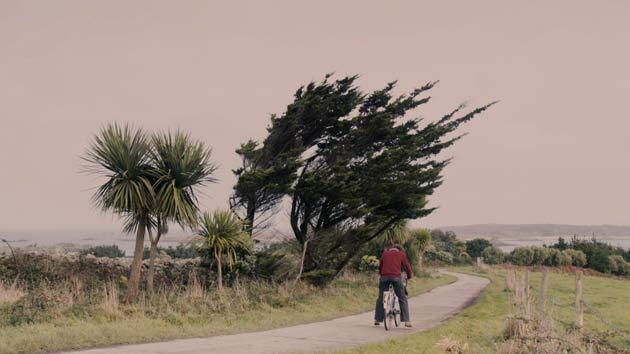Archipelago (15)

The British film-maker Joanna Hogg appears to have made her specialist subject The Holiday From Hell. It's not the places that are to blame. Her first film, Unrelated (2008), dropped by on a sojourn in a rented Tuscan villa, offering languid lunches by day and skinny-dipping in the pool by night; but oh, my dear, the people. Seldom have the Chiantishire classes been so witheringly anatomised. Her new film, Archipelago, stays closer to home, in a top-end rental on romantically wind-whipped Tresco, one of the Scilly Isles, but in mood it feels more lowering, less gregarious than her debut. It restates the impression that there's nothing like a dose of brittle, uptight, middle-class Englishness for ruining a holiday.
Tom Hiddleston, an accomplished second fiddle in Unrelated, backs into the limelight here as Edward, a young man who's just joined his mother Patricia (Kate Fahy) and sister Cynthia (Lydia Leonard) for a two-week stay. Offered a choice of bedrooms he goes for the box-room, a slightly martyrish move given its low ceilings and his gangly height. This is noticed by the disapproving Cynthia, who later argues with Edward over dinner about his gap-year plan: voluntary work in Africa on an Aids-prevention programme. We gradually pick up that brother and sister are natural antagonists, Edward's diffident do-gooding sensitivity a source of irritation to the haughty Cynthia, who seems to think everything should have its place, including the class system and world poverty.
Two outsiders are witness to these familial tensions. One is the hired cook Rose ("yeah, they taught us that at Ballymaloe"), whose low-key, uncomplaining presence makes Edward feel guilty enough to help with the washing-up. Or does he have a secret crush on her? Cynthia, naturally, thinks he should stop interfering: it's Rose's "job" to look after them. The other outsider is Christopher (Christopher Baker), a mild-mannered painter who tutors Patricia in landscape watercolours and has earnest little chats about life with Edward. Though a peripheral figure, Christopher may actually be Joanna Hogg's model as an artist, quiet, unobtrusive, nonjudgmental – and missing nothing. As director her vision is governed by a painterly stillness. The house interiors, with their hushed lighting and muted colours (sky blues, taupes), suggest she has been looking a good deal at the 19th-century Danish painter Vilhelm Hammershøi, and in the compositions of solitary figures against windows or at the dinner table one is reminded of Dutch genre painting. The very first shot of the film is of a man painting en plein air.
Of course, when you start describing a film in terms of painting, chances are that it's not overstuffed with drama. Fans of Hogg's debut will know that her meaning resides in mood, in what is not said, even in characters that aren't there. Anna, the troubled fortysomething of Unrelated, has fraught phone conversations with a boyfriend back home in London who never actually appears. The same absence recurs here in Patricia's vexed phonecalls to a husband of whom we know nothing aside from his name and his evident reluctance to be part of the family holiday (you get to thinking he's made the right choice). It also reprises a cleverness from the first film as the camera locks on a group scene, while a furious row can be heard at full volume "offstage" somewhere. But there's a difference in sympathy, too. Anna, for all her maundering, conveyed the very real anxiety of a woman whose biological window was closing.
Archipelago, on the other hand, feels as stifled and vague as its characters. Patricia, her shrieking phonecalls aside, is afflicted with lassitude, and possibly serious depression. Cynthia is either monosyllabically sullen or else so forthright as to put everyone on edge: her star moment comes during an exquisitely painful restaurant scene when she complains about an undercooked guinea fowl. Even in the case of Edward there seems not much at stake. He mooches about the house, coiled with anxiety and a reticence that could less kindly be construed as wetness. Will he make a move on Rose, or just stare at her, spaniel-eyed? Christopher gently tells him that he should "toughen up". Perhaps his year in Africa will do the trick, though his late wavering over that venture suggests he's not about to seize life by the scruff.
Hogg is spot-on about a particular strain of English behaviour that recoils at showing feeling, be it pleasure, anger, anything. Demonstrativeness is regarded somehow as bad manners, whereas screaming down the phone, so long as it's in another room, is not. But the perception isn't enough to carry a whole movie. One can enjoy the fine acting of the cast as they yarn about the best way to boil a lobster, or to pluck a pheasant; there's an astonishingly naturalism to the dialogue, like something you might overhear in a supermarket queue (meaning Waitrose). Hogg shows herself to be a proper artist by paying attention, not just to the charged silences of an unhappy family but to the physical oddities of landscape, such as the weird italic slant of trees along a curving road. But she colludes in the lack of liveliness by keeping the camera at a middle-distance on her characters and using barely any close-ups. It obstructs whatever warmth we might have felt for them in the absence of anything approaching a sense of humour. As a study in strangled English politesse this film has something to say; I only wish its voice carried a little more vigour.
Join our commenting forum
Join thought-provoking conversations, follow other Independent readers and see their replies
Comments
Bookmark popover
Removed from bookmarks